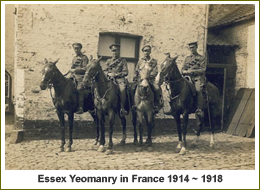I started my family history research in 2003 and as a result (along with many other things), have learned about my ancestors who have been involved in the military over the years.
I have been lucky in that one of my grandparents kept records and photos of some of these people and has in turn passed these on to one of my aunts who has happily shared this information with me. Here is a list of my relatives that I know of who have served within the military field: Dad, aunts, uncles, grandparents, a great grandfather and 3 great uncles. I have currently managed to find official records for 5 of these and that includes 3 Smith brothers.

I began my research by joining Genes Connected (now Genes Reunited), made contact with and shared information with a number who are connected to my family in some way or another and many who are not related at all. I became a regular user of the boards, particularly the Research Board, where I was able to help some and take up the assistance of others in order to move further forward (or should that be backwards) in my searches for new information. I soon noticed that people were gathering for meets and some of these were to records offices and other places that held important historical records.
It was not long before I joined a group of fellow researchers who, once in a while, visited Kew – home of the National Archives (formerly the Public Records Office). Here you can find a wealth of information. See The National Archives of the United Kingdom for more information. I have been successful in finding service records of a relative who served both in the Boer War and WW1; medal cards detailing which medals were awarded to WW1 soldiers and when; details of where soldiers who died in wars fought and where their names are listed on various memorials. I also found records of a relative who served in the Metropolitan Police and another who was a convict and was sent to Australia back i
The first records I found were the service records for a great grandfather who served in the Boer War and then went on to serve again in WW1.
The home of the National Archives, as you might imagine, is a big place and on the first floor there is the Reading Room where you can actually read original documents and the Research Room where you can view records on microfilm or microfiche. It is here that you just might be lucky enough to find your relative’s Boer War and WW1 records.
The Boer War comes under the reference WO97 and those WW1 records that survive are under references WO363 and WO364. WO363 are the burnt records where you will find incomplete pages of records. Medals awarded for service in the Boer War (1899 – 1902) were The Queen’s South Africa Medal and The King’s South Africa medal. A soldier may also have been awarded clasps to the medal, indicating where he served.
Approximately two thirds of the WW1 (1914 – 1918) records were destroyed during the London bombings of WW11 (1939 – 1945) so even finding the relevant papers for your relative is a great success. Ancestry has put the pension records of WO364 online for you to download if you have a subscription with them. Within these records you may find details of your ancestors’ physical description, age, next of kin and any children born at the time. You can also see their address, where the soldier served and when, as well as medals that were awarded to him i.e. British, War and Victory Medals.
Along with service records there are medal cards which can be downloaded from the National Archives website at a cost of £3.50 (or for the cost of a print out if you do it whilst visiting the Archives in person). This will give the soldier’s name, regimental number, regiment(s) served in and also details of the medals. From this you can find the medal rolls. If your soldier was killed during WW1 this will be indicated on the medal card and it should also state a date. When you have this information you can visit the Commonwealth War Graves Commission’s website
Here you will find information about where he died and whether he has a grave or is commemorated on a larger memorial. You can also download a certificate showing this information.
Finding any of these records in relation to your ancestor is a great achievement and you will soon find that the person will become an important part of your life even though you may never have met him. You will begin to understand that what they did has played some part in the way we live our lives today. This is why taking time to particularly remember those who lost their lives in these wars is something we should all do.
Fi & Lilly
© Fi & Lilly 2007